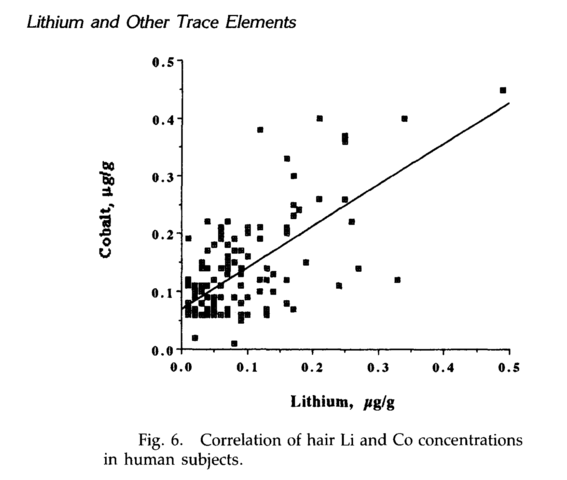Lithium and Cellular B12 AbsorptionUpdated 4 days ago
There is some research done in petri dishes about lithium helping B12 transportation. According to Dr. Lynch, there seems to be more evidence that glutathione is needed to help bind B12 to transport proteins, than evidence of lithium.
According to one research paper (see screenshot below), "A statistically highly significant direct association was observed between the hair lithium and cobalt concentrations, which suggests a role of lithium in the transport and distribution of vitamin B12."
https://www.ncbi.nlm.nih.gov/pubmed/1381936
Another study stated that "...we also investigated possible interaction and synergies between vitamin B12 and GSH and made the intriguing discovery that glutathione can prevent the formation and reaction of the Cbl(I) form of vitamin B12 with xenobiotics, such as those formed in the mammalian metabolism of the industrial chemicals styrene (1), chloroprene (2), and 1,3-butadiene."
From the same study, they state: "Our findings also indicate that GSH in mammalian tissues, by virtue of its strong binding affinity for cob(III)alamin (33), generates GS-Cbl, which could act as a protective reservoir for vitamin B12 inhibiting alkylation by epoxides and alkyl halides (41). On the basis of studies of nitric oxide with GS-Cbl, a similar suggestion has been made (42). Because of the low physiological concentration of vitamin B12, it seems a reasonable proposal that there is some protective mechanism to prevent its depletion by endogenous reactants. While it has been suggested that GS-Cbl could prevent the reaction of OH-Cbl with protein cysteinyl groups (33), ours is the first demonstration of its protective effect against alkylation by mammalian xenobiotics. Our observations are therefore inconsistent with a previous report (32) suggesting that GS-Cbl is a precursor of the cobalamin coenzymes adenosyl- and methylcobalamin (15-19). The extrapolation of our results to the in vivo situation infers that exposures to chemicals that cause significant depletion of glutathione may ultimately cause a depletion of vitamin B12. In an extreme situation of severely depleted GSH caused by a chemical exposure, typical physiological levels of vitamin B12 may be insufficient to ensure survival of the vitamin."
https://www.ncbi.nlm.nih.gov/pubmed/15606130
Additional Citations and research:
https://www.ncbi.nlm.nih.gov/pubmed/25809485
https://www.ncbi.nlm.nih.gov/pubmed/24742678
In summary, they key points here are:
- It's complicated.
- Lithium may help but glutathione is seems to be more important.
- Using hydroxocobalamin seems more stable than methylcobalamin as it also helps reduce Reactive Oxygen Species.